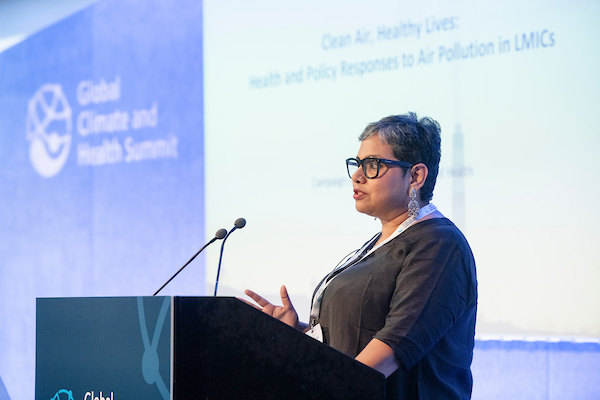Shweta Narayan’s vision for a healthy planet

Shweta Narayan, Campaign Lead at the Global Climate and Health Alliance (GCHA), delivered the final plenary session ‘Clean Air, Healthy Lives’ at our 2025 Global Climate and Health Summit. She explains how investing in clean air would not only save lives but would also build the resilience and equity required for a healthier and more just future.
Tell us about your role at GCHA
As the Campaign Lead, I work on the intersection of climate, health, and justice. My work focuses on mobilising the health community to leverage the health argument in climate action, challenge fossil fuel dependence, disinformation, and pollution. I also help build capacity among health professionals to advocate for climate action and a just and equitable transition away from fossil fuels.
Why was it important to you to be involved with the Summit?
The Global Climate and Health Summit brought together scientists, clinicians, and advocates to explore how health evidence and science can shape stronger climate action. I wanted to be part of this conversation because addressing the health impacts of the climate crisis we are facing, requires active collaboration across disciplines and geographies.
The health and research communities have enormous credibility, and by connecting policy, advocacy and the lived experiences, we can drive evidence-based solutions that protect both people and the planet.
At the Summit, you spoke about a framework and an intervention for air pollution. Please tell us more and how these initiatives can drive positive change
I participated in a session on air pollution, where I presented GCHA’s Clean Air and Healthy Lives policy roadmap, a framework that outlines practical steps for governments and health leaders to tackle air pollution through a health lens.
I also spoke at the final plenary on finance, emphasising that investing in clean air is, in fact, an investment in climate action. Air pollution presents real win-win opportunities: investments in cleaner air reduce healthcare costs, boost productivity by cutting pollution-related absences from work and school and ease the broader economic toll of pollution.
These are not just environmental or health imperatives, they are foundational investments in resilience and equity. In my intervention, I highlighted that the money exists; we’re simply spending it in the wrong places. Governments continue to pour more than $7 trillion a year into fossil fuel subsidies. Redirecting even a fraction of those funds toward clean air solutions could save millions of lives, protect public health, and accelerate the transition to a healthier, more just future.
What was a highlight for you?
I was deeply inspired by the strong presence of young health professionals and community organisers who are integrating climate science into clinical and community practice. One highlight was hearing from young health organisers from Africa, who were using their own lived experiences of health harms of air pollution as a tool to organise their community, raise awareness in the public and demand accountability from their governments on actions for clean air. It reaffirmed the power of collaboration and science-based advocacy.
What do you think is the greatest challenge in tackling the impact of climate change?
The greatest challenge is not a lack of evidence or technology, it’s the lack of political will, sustained by disinformation and vested interests and the idea that human life is dispensable before profits. We know that fossil fuels are responsible for both the climate crisis and millions of premature deaths from air pollution each year. Yet, corporate influence and rampant disinformation continue to delay the phase-out of fossil fuels. Tackling this means addressing the integrity of information, governance, and finance systems that enable inaction.
How important is the role of physiology in climate change and health discussions?
Physiology plays a foundational role. Understanding how the human body responds to heat, air pollution, and other environmental stressors helps translate the abstract concept of ‘climate change’ into tangible human impacts. It makes the science deeply personal and actionable. Physiological research also strengthens the evidence base for policy, informing exposure thresholds, healthcare preparedness, and early warning systems.
What are your hopes and vision for the future?
My vision is for a world where healthy people live on a healthy planet, where clean air, safe environments, and just energy systems are treated as fundamental rights, not privileges. I hope to see the health community continue to be a moral and scientific voice in calling for fossil fuel phase-out, clean energy transitions, and accountability for pollution-related harms.
What actions do you think could help achieve this?
We need to integrate health into every climate decision, from energy to transport to urban planning, and hold governments accountable for delivering on that promise. Governments must adopt and enforce health-centered policies and end fossil fuel subsidies that continue to fuel both pollution and inequality. This is not just about better policies, but about justice: those least responsible for the crisis are bearing its heaviest health burdens. Challenging fossil fuels, the root cause of the climate crisis, and demanding transparency and accountability from both industry and policymakers must remain at the heart of our response.
Health institutions can lead by example through fossil-free procurement, divestment, and advocacy. And as individuals, we can use our voices as scientists, clinicians, and citizens, to insist that policy reflects what science and ethics already make clear: protecting health and achieving climate justice both depend on ending our reliance on fossil fuels.
You can watch Shweta Narayan’s plenary speech and air pollution session on our Global Climate and Health Summit hub. Plus, read more about the next steps for driving climate action following the Summit.

